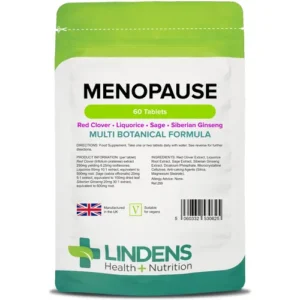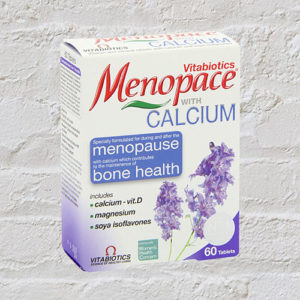Often referred to as a woman’s “change of life”, menopause is a medical term that means the last menstrual cycle of a woman’s life. It is also sometimes called climacteric.
Every woman’s experience of this time in her life is different, but the process is a normal one that every woman will eventually go through.
When Can a Woman Expect to Experience Menopause?
For most women, menopause occurs roughly between her mid-40s and mid-50s, though for some women menopause may occur earlier or later than this. In Britain, the average age of menopause is 51. Genetics play a role in menopause, so talking to your mother, grandmother, or older sister can give you a clue as to when you may expect it. If you smoke, you may experience menopause sooner than non-smokers.
No matter your age, if you have a hysterectomy that includes removal of both ovaries, or if you go through radiation therapy or chemotherapy that destroys the ovaries, menopause will occur instantly. When menopause occurs abruptly or prematurely, the symptoms can be more extreme and uncomfortable. In some cases, a sort of temporary menopause may be medically induced as a treatment for certain reproductive conditions. Though a woman may experience many of the symptoms of menopause during such a treatment, it isn’t true menopause, as menstrual cycles can be expected to return after the treatment.
Why Does Menopause Occur and What Triggers It?
Unlike boys, who begin producing sperm in puberty and continue to do so for many years, girls are born with all the eggs they’ll ever have. With each menstrual cycle, the supply of eggs is reduced and as she ages, the quality of a woman’s remaining eggs declines. As a woman enters her forties, the remaining eggs in a woman’s ovaries will fall.
Follicle Stimulating Hormone (FSH), the primary hormone responsible for stimulating maturation, is produced in the pituitary gland. As a woman ages, the remaining eggs become less able to respond to the hormone than they were years earlier. As the eggs fail to respond to the hormone, the ovaries will occasionally fail to release eggs. This will cause a reduction in oestrogen and progesterone, the primary female sex hormones. The pituitary gland responds by increasing production of FSH in order to stimulate the ovaries and stimulate the eggs to mature. This will cause your periods to become unpredictable.
Oestrogen and progesterone are the hormones responsible for preparing your body to support a possible pregnancy each month. If the egg is not fertilised, it is shed along with the uterine lining, and you have your period. When an egg fails to mature and be released, production of these hormones declines, which causes the symptoms of menopause. All the normal symptoms of menopause are simply an adjustment to falling hormone levels.
Oestrogen is responsible for a variety of functions in the female body. It is responsible for the development of breasts, genitals, and the womb, as well as preparing the body to support a pregnancy. As the supply of eggs begins to decline, so does the need for oestrogen. When the hormone is no longer required, production declines.
What Symptoms Can I Expect to Experience?
Approximately one in five women will experience no symptoms other than irregular periods, while the rest will experience some degree of menopause symptoms. Some women will experience serious problems that interfere with their lifestyle. Common symptoms of menopause include:
- Irregular periods — Most women will experience irregular periods for months, in some cases years, before they stop completely. Menstrual flow may vary, with some periods being lighter than normal, others heavier.
- Hot flushes — This may well be one of the most distinct and common symptom of menopause. Women with hot flushes experience sudden and intense feelings of being very hot and sweaty and may become flushed. These may be over in a few seconds, or may last several seconds. When hormone levels first begin to fall, these episodes may occur many times a day. Eating spicy foods or drinking alcohol may trigger them to occur more often. Hot flushes are harmless, but may be uncomfortable.
- Vaginal dryness — The decline in hormone levels can cause the vaginal walls to become thinner and you may experience dryness that can cause pain during intercourse. If you do experience pain, a water-based lubricant can make intercourse more comfortable. The dryness and thinning can increase your risk of infection, including thrush and cystitis. If you have any unusual bleeding or discharge, be sure to see your doctor.
- Mood swings — Many women going through menopause experience headaches and may be forgetful or irritable. These are all common and most people will overlook these swings.
- Fatigue — Symptoms of menopause can interfere with sleep, causing daytime fatigue.
- For those experiencing menstrual pain during perimenopause, TENS machines can provide drug-free relief. Learn more about using TENS for period pain in our article Zap Away Your Period Pain: The TENS Machine Fix.
For many women, menopause occurs during an already difficult time. Some women are trying to cope with teenagers, others with adjusting to adult children going to college or moving out, some may be caring for grandchildren. Some women may be experiencing difficulties at work or in relationships. For others, it may be difficult to adjust to a new chapter in their lives. It’s important to keep in mind that menopause doesn’t cause these problems, though it can make them harder to cope with. Keeping everything in perspective can ease the transition. Talk to your doctor about any symptoms of depression, regardless of their cause.
While menopause technically refers to the last period of your life, the process is not instant and symptoms last an average of four years. Most women continue their lives as normal during the process. For some, no longer needing to worry about getting pregnant or dealing with heavy or painful periods brings a sense of relief and feelings of freedom. After the last menstrual period a woman cannot conceive children naturally.
Managing Emotional Changes During Menopause
Menopause can bring a rollercoaster of emotions. Many women report feeling more anxious, irritable, or even depressed. These mood swings aren’t just in your head – they’re real and tied to hormonal shifts.
To cope:
- Practice mindfulness or meditation
- Get regular exercise to boost endorphins
- Connect with friends and family for support
- Consider joining a menopause support group
- Try keeping a mood journal to spot patterns
Remember, it’s okay to seek help. If emotional changes are disrupting your life, talk to your doctor. They might suggest counselling or medication to help you through this transition.
What Are the Long Term Effects of Menopause?
As hormone levels decrease your skin will become thinner and dryer, including the skin of the vaginal wall, and your hair may also begin to thin. Your womb will also shrink and its lining will thin. Your bones will also become more fragile and your risk of osteoporosis will increase. About 25% of women will suffer from the condition, which makes them susceptible to bone fracture. Osteoporosis occurs most often after menopause, when the bones begin to lose calcium.
Oestrogen seems to protect the heart and blood vessels. As oestrogen levels fall, your risk of heart disease increases.
How Do Doctors Diagnose Menopause?
Menopause is typically diagnosed based on symptoms and age. If there is a doubt, your doctor may check levels of FSH. You should always discuss any problems or unusual symptoms with your doctor.
There are tests available to check for elevated levels of FSH in the urine. Click here for more information on at home FSH tests or to purchase.
Are There Treatments for Menopause?
There are no treatments for menopause, but many of the symptoms can be eased with exercise, diet, and other lifestyle changes. Exercise, even walking 20 to 30 minutes several times a week, can help you stay fit, keep your bones strong, and reduce your risk of heart disease.
A well-balanced diet that includes plenty of foods high in calcium can help keep your bones strong and reduce your risk of fracture. Calcium rich foods include dairy products, sardines, salmon, and leafy green vegetables. Drinking a small glass or two of red wine a few times a week can help reduce your risk of heart disease.
Use a water-based vaginal lubricant such as KY jelly to combat vaginal dryness. These lubricants are available at most pharmacies.
If you find yourself suffering from frequent hot flushes, be sure to dress in layers that you can remove as needed. Keep a glass of water at your bedside and sleep with a window open or fan blowing on you to help you deal with night sweats.
Get out in the sun as often as possible. Sun exposure stimulates your body to produce vitamin D, which is essential to helping your body absorb and use calcium to keep your bones and teeth strong.
Don’t smoke, and if you do smoke, stop. Smoking can aggravate symptoms and worsen bone thinning.
Hormone replacement therapy can make up for the decline in oestrogen in women who experience severe symptoms of menopause or who find it difficult to function normally. Click here for more information on hormone replacement therapy.
Other medications can treat specific symptoms of menopause. These include antidepressants, sleeping pills, tranquillisers, or sedatives. Talk to your doctor about any symptoms that are uncomfortable, interfere with your life, or otherwise cause you concern.
Natural Remedies for Menopause Relief
If you still have trouble dealing with symptoms, talk to your doctor about supplements. Black Cohosh, Vitamin D and Evening Primrose Oil have helped ease the symptoms of menopause for many women. Agnus Castus has been clinically proven to relieve hot flushes. Similarly Maca can level cortisol and reduce hot flushes. Sage Leaf can provide hot flush relief and can also help with digestion and headaches. Flaxseed Oil can also help as it contains naturally occurring chemicals with estrogen-like effects. This makes it a particularly promising treatment for menopause symptoms.
In addition to supplements, there exist multiple alternative remedies that can offer relief from the symptoms of menopause. One such remedy is acupuncture, an ancient Chinese practice that involves inserting thin needles into designated points on the body to encourage energy flow and achieve balance. Extensive research has indicated that acupuncture effectively diminishes hot flashes, enhances sleep quality, and mitigates mood swings experienced by menopausal women.
Another effective drug-free option for managing menopause-related pain is TENS therapy, which uses gentle electrical pulses to block pain signals. Discover how TENS machines work and their many benefits in our article TENS Machines: A Revolutionary Solution for Pain Management.
Phytoestrogens are another natural remedy garnering increased recognition. These are substances found in plants that imitate estrogen’s effects within the body. Foods such as soybeans, flaxseeds, chickpeas, and lentils contain plentiful amounts of phytoestrogens and possess the ability to alleviate unpleasant symptoms including hot flashes and vaginal dryness.
Exercise serves as a formidable natural remedy to alleviate the effects of menopause. Regular physical activity not only aids in controlling weight gain often experienced during this phase but also stimulates the release of endorphins, which are innate mood-enhancers. Participating in activities such as walking, swimming, or practising yoga can effectively mitigate symptoms like anxiety, depression, and irritability.
Alongside these remedies, implementing certain changes to one’s lifestyle can significantly contribute to managing menopause symptoms. Obtaining sufficient sleep is paramount since sleep disruptions are common during this transitional period. Establishing a calming routine before bedtime, refraining from consuming caffeine or engaging in stimulating activities prior to sleep, and ensuring a comfortable sleeping environment collectively support better sleep quality.
Do I Still Need to Use Contraception?
Though fertility decreases with age, it is still possible to become pregnant until after your final period. If you are over the age of 50, you are considered to no longer be at risk of pregnancy after you have not had a period in a year. If you are under 50, you should use contraception until you have been without a period for two years. Pregnancy and childbirth are significantly riskier later in life, and raising a small child may be more difficult.
Where Can I Get Further Advice or Help with Menopause Issues?
Luckily, there are now many support groups available to help and support women who are going through the menopause. Menopause Matters is an independent website offering up-to-date, information about the menopause, menopausal symptoms and options for treatment. Outside of the UK, North American Menopause Society (NAMS) is a leading non-profit organisation aimed at promoting the quality of life and health of all women during their mid-life and onwards.
Further useful advice on menopause can be found on the NHS Choices website.
Photo “Menopause” by Anthony Cunningham for Zoom Health
Zoom Health is a leading UK supplier of Home Health Tests and Earplugs
This post was originally published in November 2018. It was last updated in April 2025.







